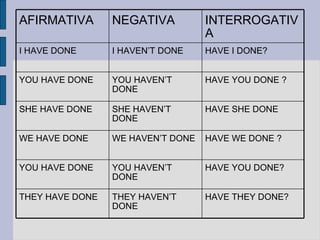El documento explica la formación y usos del tiempo verbal Present Perfect Simple en inglés. Se forma con el verbo auxiliar have + el participio del verbo principal. Se usa para acciones que empezaron en el pasado y continúan hasta el presente, acciones pasadas con resultado actual, o acciones pasadas sin especificar el momento. También se explican expresiones temporales como ever, never, already, just, yet, for y since.





